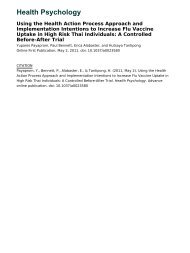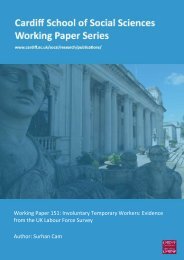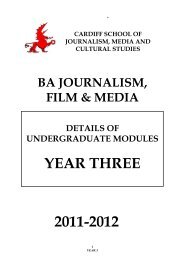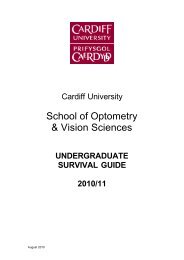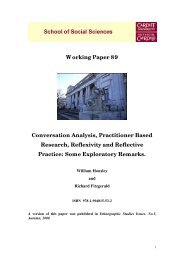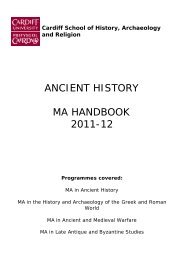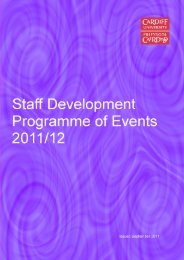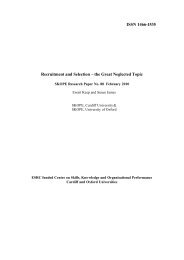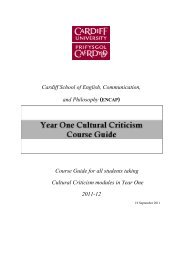Year 3 Catalogue 2011-2012 - Cardiff University
Year 3 Catalogue 2011-2012 - Cardiff University
Year 3 Catalogue 2011-2012 - Cardiff University
You also want an ePaper? Increase the reach of your titles
YUMPU automatically turns print PDFs into web optimized ePapers that Google loves.
HOW TO USE THE MODULE CATALOGUE<br />
The catalogue includes details of all the degree programmes offered by the School. Students<br />
should therefore refer to their year of study for <strong>2011</strong>-12 and to the degree programme for which<br />
they are registered. Modules are listed by ascending module code number. For students<br />
undertaking a joint degree programme with a subject from outside SOCSI, a module list/catalogue<br />
will need to be obtained from the appropriate joint department/School.<br />
Things to consider when making module choices:<br />
• The compulsory modules that are required for the degree programme.<br />
• Modules that may be required for recognition by professional bodies (for example British<br />
Psychological Society/BPS).<br />
• Modules that may be useful for future careers / employment opportunities.<br />
• Opportunities to develop special interests.<br />
All students should discuss their module choices with their personal tutor. Students may also wish<br />
to talk to particular module convenors, or to the careers advisory service.<br />
DEGREE REQUIREMENTS<br />
You must ensure that you comply with the requirements for the degree programme for which you<br />
are registered. For all programmes there will be some compulsory modules. Most programmes<br />
also allow some degree of choice across the range of modules offered by the School. Students<br />
undertaking a single honours degree are likely to have slightly more module choice than those<br />
studying a joint honours degree.<br />
In each year of study all students should take 120 credits of modules at the appropriate level* (i.e.<br />
year 3 students should take 120 credits at level 3). In SOCSI all modules are 20 credit modules<br />
taught across the Autumn and Spring Semesters. (The ONE exception to this is SI0131<br />
Dissertation, which is a 40-credit module available in year 3). Level 2 and level 3 modules are<br />
equally weighted in SOCSI. This means they count equally toward the final degree award.<br />
Under the <strong>University</strong> regulations students are permitted to take up to 160 credits in any one<br />
academic year. We would only recommend that students take more than 120 credits in exceptional<br />
circumstances, and only after consultation with a personal tutor.<br />
Degree programmes in SOCSI reflect the National Qualification Framework and benchmark<br />
standards of the Quality Assurance Agency for Higher Education (QAA) (www.qaa.ac.uk). This<br />
means that all degree programmes are comparable across the UK.<br />
ASSESSMENT<br />
The module descriptions all contain details of the schedule of assessment. Students should note<br />
the modes and timings of assessment when making their module choices. More general<br />
information about assessment and the marking criteria that the School uses to assess<br />
examinations and coursework can be found in the undergraduate assessment handbook,<br />
distributed at the beginning of each academic session and available on Learning Central.<br />
Written examinations usually take place at the end of the semester according to the timetable<br />
published by the Academic Registry. Deadlines for coursework and dates for presentations and<br />
other forms of assessment may differ across modules and will be made clear at the start of each<br />
module. All deadlines for assessment must be adhered to.<br />
Previous examination papers for modules are available on the Information Services (INSRV) web<br />
pages (http://exampapers.cf.ac.uk/). In the case of new modules, or modules that have been<br />
significantly revised, a sample examination paper will be made available during the academic<br />
session.<br />
4



